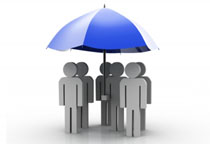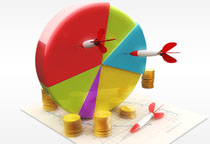Glossary of Debt Terms
Bankruptcy (see Personal Bankruptcy)
Chapter 7 Bankruptcy is the most typical kind of bankruptcy in
the United States. It occurs when a debtor's assets are liquidated
to meet credit obligations. In some states, personal property like clothing, household goods, older cars and one's home is exempt
from liquidation. Non-exempt property is surrendered by the debtor
to a bankruptcy trustee, who liquidates the property and distributes
the proceeds to creditors.
Chapter 11 Bankruptcy typically applies to corporations, business partnerships, or individuals with considerable debts and assets. The chapter permits reorganization under the bankruptcy laws of the
United States. Business owners provide a reorganization plan to maintain the survival of their business and pay creditors over time.
Chapter 13 Bankruptcy helps consumers with a regular income to setup a payment plan to repay their debts. This commonly involves hiring an attorney. Debtors retain ownership and possession of all
their assets in exchange for contributing part of their future income
to repaying their creditors.
Consumer Credit Counseling Service (CCCS)
Companies assess the amount of debt you can afford to repay each month. They discuss your financial situation with creditors and persuade them to reduce your monthly payments until all debts are paid. A signed agreement commits you not to incur any further debts before the existing debt is paid, and to make a single monthly payment.
Credit Card Debt refers to amounts owed to credit card companies
for funds borrowed on a credit card.
Credit Card Debt Consolidation Loans enable borrowers to pay
off balances on credit cards by combining credit card debts into a
single monthly payment with a lower rate of interest.
Credit Card Debt Management Companies help individuals reduce debt on credit cards by negotiating with creditors to reduce or waive
the interest rate and credit card fees. A debt management plan is
usually established, requiring debtors to deposit monthly payments
into an account. The debt management company uses the payments
to pay off the creditors.
Creditors are individuals or organizations to whom you owe money,
and commonly includes banks and credit card companies.
Debt Consolidation Loans are designed to assist people with debt.
All existing loans are combined or "consolidated" into a single loan.
Debt consolidation loans may simplify debt analysis, monitoring and repayments and often result in a lower interest rate and reduced debt repayments.
Debt Management Plans map out a financial strategy, designed to
help consumers repay debts and creditors recoup money owed to them.
Debtors are individuals who owe money on credit cards, personal loans and home mortgages, etc.
Debt Settlement is a negotiated agreement with creditors to "settle"
for a payment lower than the outstanding debts. Debtors pay their funds into a holding account which is transferred to a creditor when it has reached the agreed amount. The process repeats with each creditor until all the accounts are paid.
Personal Bankruptcy is a legally declared inability or impairment of ability of an individual to pay their creditors. In the United States bankruptcy is a matter placed under Federal jurisdiction. Bankruptcy cases are always filed in United States Bankruptcy Court, and are often dependent upon State law. State law has a major influence in many bankruptcy cases, and it is often not possible to generalize bankruptcy law across state boundaries. Consumers can still be obligated to repay all their outstanding debts.
Secured Debt is debt backed by collateral (property pledged by a borrower to protect the lender). The collateral guarantees payment of the debt, or the lender/creditor can claim the collateral. Secured debt is most common when purchasing homes or cars.
Unsecured Debt is debt with no collateral (property pledged by a borrower to protect the lender). It is commonly used with credit cards, doctors' bills, student loans, rent and personal loans.
Articles & Features
Find out how a debt program can be used to achieve better repayment terms and offer you a lower interest rate on your debts.
What Are Debt Consolidation Loans?
Debt consolidation loans involves merging all outstanding debts together into one to attain better repayment terms and reduce the rate of interest on the loans.
Debt relief occurs where the consumer seeks help with current debt obligations. This may include a review of your debts and a new debt repayment plan tailored to your specific needs.
Debt Programs
Find out about debt program options tailored to your needs.
Debt Relief
Improve your debt situation with debt relief advice.
Debt Consolidation
How consolidating your debts can help save money.
Credit Counseling
Understanding your credit counseling options.





